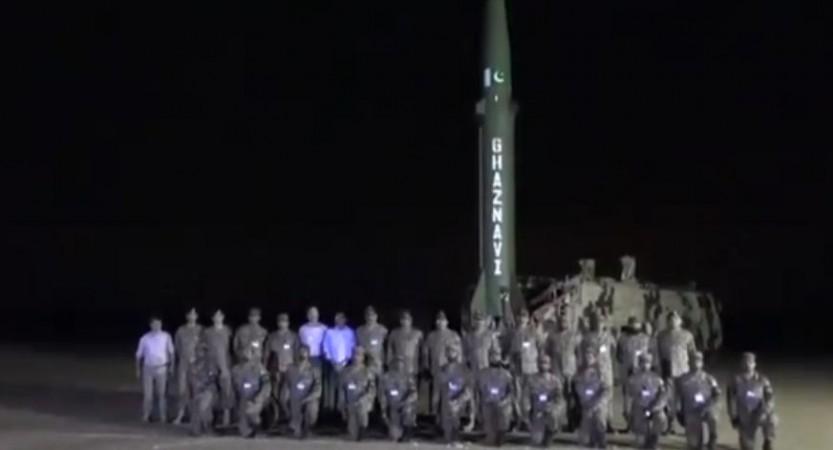
Pakistan carried out a successful night training launch of ballistic missile capable of delivering various types of warheads on Thursday, August 29, a day after the country closed its airspace to India in a bid to internationalise the Kashmir issue.
"Pakistan successfully carried out night training launch of surface to surface ballistic missile Ghaznavi, capable of dilivering multiple types of warheads upto 290 kms," said spokesperson of Pakistan Armed Forces, Major General Asif Ghafoor.
Pakistan successfully carried out night training launch of surface to surface ballistic missile Ghaznavi, capable of delivering multiple types of warheads upto 290 KMs. CJCSC & Services Chiefs congrat team. President & PM conveyed appreciation to team & congrats to the nation. pic.twitter.com/hmoUKRPWev
— DG ISPR (@OfficialDGISPR) August 29, 2019
He also said Pakistan President Arif Alvi and Prime Minister Imran Khan congratulated the team for their efforts.
The Pakistan government had informed India about the scheduled missile tests in Sindh as per the 2005 Confidence Building Measures (CBM) on August 26, according to Hindustan Times. The measure includes a mandatory three-day notice prior to a missile test.
According to the NOTAM (notice to airmen) and the naval warning issued by the Pakistan Aviation Authority on Wednesday, three international air-routes over Karachi have been closed from August 28 to August 31.
Reports suggest that Pakistan is likely to test Ghaznavi surface-to-surface missile (SSM) which has a range of 300 km. The launch will take place in Sonmiani flight tests range in Balochistan and will be tracked by the National Development Complex (NDC) ground control station in Sindh's Nooribad and Goth Piaro region. The test range has been activated with an upper limit of 26,000 feet and impact to sea. Naval installations and ships have also been moved from the region.
The missile test, according to inputs by Indian officials, is meant to appease the people of Pakistan, including terror groups who have sought "justice" for the disputed region. "The ballistic missile test is aimed at the domestic audience with opposition political parties slamming PM Khan for so-called letting Kashmir slip out of Pakistan's grasp under his watch. The test is just a political message to drive home the nuclear flashpoint theory," an official told HT.
Tensions between India and Pakistan heightened after the Indian government abrogated the special status granted to Jammu and Kashmir under article 370 of the constitution and bifurcated the state into J&K and Ladakh.
While India has maintained that New Delhi's decision was an internal matter, Pakistan has sought to internationalise the issue. Despite its efforts, the majority of the international community, including the United Nations, have echoed India's stance and stated that the Kashmir issue is a bilateral matter under the Simla Agreement and Lahore Declaration.
Pakistan Prime Minister Imran Khan had earlier made provocative statements in an interview with The New York Times, in which he accused India of rejecting Islamabad's requests for peace dialogues, hinting possible military conflict between the two nuclear-armed neighbours.
India has responded to the comment by saying that the Indian initiative towards peace have "turned badly" and reiterated the issue of cross-border terrorism which it claims is state-sponsored.
A recent intel report suggested Pakistan is planning to push 100 'hardcore' terrorists from Afghanistan into the Kashmir Valley. Pakistan-based terror groups are planning serial attacks in Kashmir in an attempt to deceive the international community into showing the deteriorating situation in the valley.
Last week, six Lashkar-e-Taiba (LeT) terrorists infiltrated into Tamil Nadu via Sri Lanka. Indian Navy Chief Admiral Karambir Singh said that the Navy, maritime police, state governments and other stakeholders are making sure there is no intrusion from the sea.









